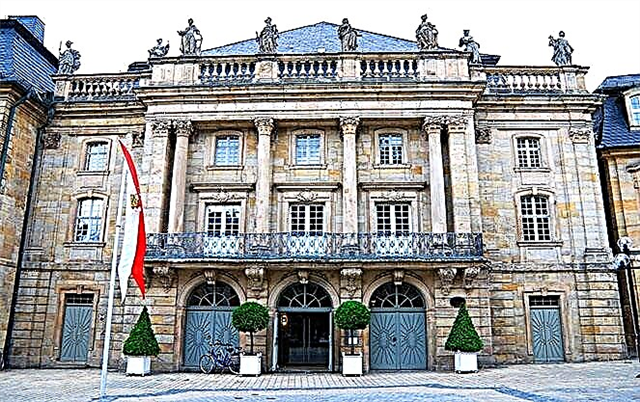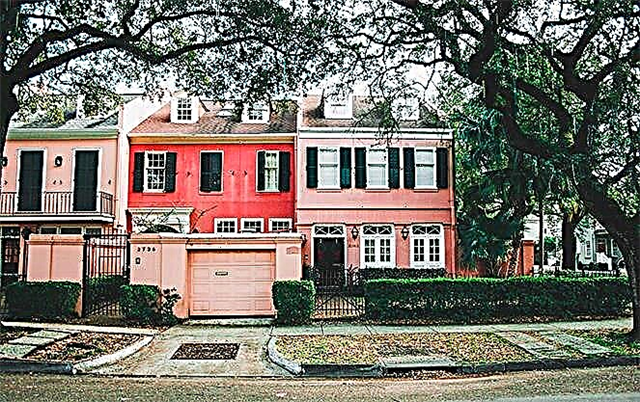Foreign nationals who intend to live in Germany but do not have sufficient funds to purchase their own housing should not be discouraged. First, foreigners have the right to rent housing on an equal basis with German citizens. Secondly, renting an apartment in Germany is not as difficult as it might seem. Thirdly, living in rented housing in Germany is often more profitable than owning your own house or apartment - more than half of the German population does not have their own housing, preferring to rent it.

The real estate market in Germany: briefly about the main
The main feature of the German real estate market is stability. Prices, of course, do not stand still and are growing every year, but this growth is taking place against the background of rising incomes of the German population and is not accompanied by sharp jumps and fluctuations.
This stability allows you to receive dividends from the rental of real estate, albeit small - from 4 to 7% per year, but guaranteed and without any risk.
Low mortgage interest rates - from 0.8 to 2% for German citizens and from 3 to 5% for foreigners - make this business even more attractive, including for foreign investors.
Another feature is the large difference in prices for residential real estate in different regions of Germany. Higher prices in the southern and western federal states and major cities: Munich, Frankfurt am Main, Hamburg, Stuttgart, Dusseldorf, Berlin.
For example, the cost per square meter of housing in Frankfurt am Main is on average about 5 thousand euros. At the same time, real estate prices in eastern Germany are almost three times lower - an average of 1.3-1.5 thousand euros per square meter, for example, in Dresden or Berlin, which allows you to buy housing here at more favorable prices.
There is a large selection of primary and secondary housing on the market.
Rental housing in Germany: which is preferable for foreigners
 The German real estate market offers great opportunities for foreign citizens, since they are given the same rights as citizens of Germany. Therefore, they can rent real estate, own it, sublet it.
The German real estate market offers great opportunities for foreign citizens, since they are given the same rights as citizens of Germany. Therefore, they can rent real estate, own it, sublet it.
Any foreigner legally staying in Germany (from student to businessman) will be able to find accommodation taking into account their preferences and capabilities. The choice of this or that type of housing, be it a room in a communal apartment, an apartment or a mansion, depends on the financial capabilities, social status of the tenant, the purpose of his stay in Germany, and marital status.
Let's consider in more detail what awaits a foreign tenant in each specific case.
- A room in a student dormitory. Students who entered German universities can apply for it. The main and, perhaps, the only plus of this type of housing is the ability to rent it inexpensively. The disadvantages include the fact that the settlement takes place only on a first come, first served basis, so there may simply not be enough places, as well as the “joys” of life in a hostel: noisy neighbors, possible everyday problems, interruptions in the Internet.
- Renting a room in a communal apartment (Wohnungsgemeinschaft or WG). In most cases, we are talking about a multi-room apartment in which several tenants live. The advantages of renting this type of housing are obvious, first of all, from a material point of view: the rent is divided among several people. In addition, this is an opportunity to cooperate with friends and live in WG with your company. The disadvantages of this type of housing include the need to conclude an agreement not so much with the landlord (subject to your ability to pay and legal status, there will be no problems here), but with the tenants of WG.
In order to rent a room for a student, he will need to go through an informal “bride show” - an interview-acquaintance with tenants who already live in the apartment. One or two people usually live in each room of such an apartment. Toilet, bathroom, kitchen are in common use. Residents of each room in turn are obliged to take care of their cleaning and maintenance.
- Rent a separate apartment (Wohnung). This option is the most common among foreign citizens who intend to live in Germany for some time. Singles and students more often tend to rent a one-room apartment with an area of up to 40 sq. m. Representatives of the middle class prefer apartments up to 60-70 sq. m. m with two or three rooms (Zimmer). Apartments with an area exceeding 100 sq. m, is already an elite sector.
Citizens of the CIS countries should be aware that when calculating the living space (Wohnfläche or Wfl) in Germany, the following must be added to the area of rooms with straight walls:
- 50% of the area under sloped walls at a height of 1-2 m (in attics (Obergeschoss or OG);
- 25% of the area of the balcony, loggia, terrace;
- 50% of the veranda area (if not heated).
- House rent. A rented house is quite expensive, because in addition to the rent, you also need to pay additional fees for its maintenance. Nevertheless, villas on the coast of the North Sea or the Baltic Sea, as well as country houses, are in demand, especially in the summer. Fresh air, tranquility and beautiful nature plus comfortable living conditions and a high level of infrastructure development in Germany more than compensate for all material costs. This option is especially attractive for families of 4 or more people, as well as pet owners.
Housing in Germany for a foreigner: how and where to look
 The time frame during which you can find suitable accommodation in Germany depends on how well the search is organized. It is necessary to immediately tune in to the fact that it will be quite difficult to find an apartment in Germany, especially in big cities.
The time frame during which you can find suitable accommodation in Germany depends on how well the search is organized. It is necessary to immediately tune in to the fact that it will be quite difficult to find an apartment in Germany, especially in big cities.
If there are relatives in Germany, it is appropriate to involve them in the search for housing. You can also ask your employer for help.
Among the factors that can make it difficult for a foreigner to find housing:
- the presence of a large number of competitors,
- poor knowledge of the German language,
- poor orientation in local legislation and real estate rental issues.
Nevertheless, there is every opportunity to get by on your own and find housing on your own. If necessary, you can always resort to the help of professionals - brokers and real estate agencies.
When looking for housing in Germany, you should pay attention to several points:
- It is easier for one person to rent an apartment than for a married couple (the wear and tear of the apartment will be half as much). Therefore, brokers advise tenants not to disclose all cards at once - after settling in and paying money, it will be much easier to agree on a second tenant;
- German landlords are more inclined to rent housing to compatriots than to foreigners;
- Landlords pay special attention to financial condition, availability of work and clean credit history.
Among the main recommendations for a successful search for housing are the use of all possible methods and means, notification of the search for housing to all acquaintances, personal activity and assertiveness.
The correct psychological impact on the potential landlord is of great importance: a solid appearance, the ability to win over, punctuality, a conversation to the point.
At the same time, you should not devote the landlord to all the details and, if necessary, “reassure” him a little by discussing the possibility of renting an apartment for a long time (at least 10 years) or assuring that the creation of a family and the birth of a child is not planned in the coming years.
Before concluding a lease, you need to do the following:
- inspect the apartment on a weekday after 5 pm (as a rule, at this time the neighbors-tenants return after a hard day and the house lives a normal life);
- talk to neighbors about any problems in the house;
- explore the nearest neighborhoods on the city map and find out if there is an airport or a garbage dump nearby, if there are highways or a railway nearby, how convenient are communications, shops, childcare facilities;
- pay attention to the little things: the availability of parking spaces, the location of the heating batteries, the connection point for the washing machine.
Self search
 Newspapers in Germany (especially local ones) play an important role in real estate search. Private ads in them are submitted, first of all, by owners of apartments of retirement age living in the region, who do not trust the Internet too much.
Newspapers in Germany (especially local ones) play an important role in real estate search. Private ads in them are submitted, first of all, by owners of apartments of retirement age living in the region, who do not trust the Internet too much.
In addition, in the newspapers you can place your own advertisement for looking for housing. It is best to look through the morning issues and immediately call up the options you like.
Please note that most German newspapers have their own websites on which online rental advertisements are published on certain days of the week: for example, on Wednesdays and Saturdays - Abendzeitung.de, Wednesdays and Fridays - sueddeutsche.de.
The all-German portal (bdzv.de) contains German newspaper websites, most of which have sections related to renting an apartment and finding the right options - for example, in the Berliner Zeitung: www.berliner-zeitung.de.
And although newspapers should not be underestimated, you can still get the lion's share of information on specialized Internet sites. The most famous and popular are the following sites:
- immobilienscout24.de;
- mieten.immonet.de;
- wg-gesucht.de;
- immowelt.de;
- immonet.de.
Information on them is updated regularly, so these sites should be visited several times a day, since the best offers "leave" within 1.5-2 hours after they appear.
Dozens of groups have been created on social networks, which also make it possible to find an apartment or a room for a student.
For foreign citizens who are trying to find an apartment on their own, it is important to learn how to read the ads correctly. The fact is that in Germany various abbreviations and abbreviations are used. Not knowing them or reading them incorrectly can lead to financial losses or to the fact that the desired apartment "will go" to another tenant.
List of major abbreviations in home listings
| AB | Altbau | old house |
|---|---|---|
| V | Bad | Bath |
| BLK | Balkon | Balcony |
| BK | Betriebskosten | Overheads |
| Gge | Garage | Garage |
| D | Diele | Hallway |
| DB | Duschbad | Shower room |
| EBK | Einbauküche | Built-in kitchen |
| EG | Erdgeschoss | First floor |
| MM | Monatsmiete | Monthly rent |
| MV | Mietvertrag | Apartment rental agreement |
| NB | Neubau | New house |
| OG | Obergeschoss | Second floor |
| OH | Ofenheizung | Stove heating |
| SZ | Schlafzimmer | Bedroom |
| TG | Tiefgarage | Garage under the house |
| Zi-Whg | Einzimmerwohnung | One room apartment |
| Wm | Waschmaschine | Washer |
| Z | Zimmer | Room |
| ZH | Zentralheizung | Central heating |
Thus, the abbreviation 4ZКDBD, 2SZDTG will mean a four-room apartment with a kitchen, bathroom, shower room, two bedrooms, an entrance hall and an underground garage.
Finding housing through real estate agencies
A common way to find housing in Germany is to use the services of numerous brokers and real estate agencies (for example, Liz Frey Relocation, L MrLodge).
Most agencies employ English and Russian speaking realtors. This will save time and entrust the search to professionals.
In order to use their services, you must conclude an agreement (Bestellerprinzip) with an agency, according to which you will need to pay a fee (Provision).
Take a sociological survey!
[yop_poll id = ”7 ″]
Renting a lease: what you need to know
 After the apartment has been selected and an agreement has been reached with the owner of the property, you can proceed with the registration of the lease agreement. An official document on renting in Germany guarantees one hundred percent fulfillment of what is fixed on paper, therefore, this document must be prepared with all responsibility.
After the apartment has been selected and an agreement has been reached with the owner of the property, you can proceed with the registration of the lease agreement. An official document on renting in Germany guarantees one hundred percent fulfillment of what is fixed on paper, therefore, this document must be prepared with all responsibility.
The contract must state the following:
- the size of the rental rate;
- the amount of prepayment for utilities (Nebenkosten);
- the amount of the collateral (Kaution);
- terms of the contract (Dauer). In most cases, the contract is open-ended;
- terms of notification of termination of the contract (Kuendigungsfrist). The minimum period is three months before the move. To do this, you must send the owner a written notice (Kuendigung) and receive confirmation from him;
- terms of cosmetic repairs (once - at the entrance or exit);
- housing area;
- number of rooms;
- the number of keys to be transferred from the doors (entrance and internal);
- order of residence (housordnung);
- when renting a furnished apartment - a description of the property and its condition;
- the procedure for payment by the tenant for minor breakdowns (up to 100 euros) that may arise during the operation of the property (leaking tap, etc.);
- the possibility of keeping animals;
- the procedure for resolving issues that have arisen that have not been taken into account in the contract, etc.
Before settling in, a protocol for the transfer and acceptance of housing should be drawn up together with the owner of the apartment or the manager of the house. This protocol is considered as an annex to the contract.
It is necessary to enter into the application all the numbers and readings of the meters for heating, cold and hot water, gas, electricity on the day of renting the apartment, as well as all noticed shortcomings (cracks, chips, scratches, etc.).
When leaving, a new protocol is drawn up, which is checked against the first. These documents must be signed by both parties, otherwise the landlord may not return the bond.
What documents are required to sign a rental contract in Germany
In order to conclude a deal and draw up a lease agreement, a foreign citizen will need the following documents:
- copies of residence permit, passport and visa;
- salary certificate (for the last three months);
- certificate of credit history (Schufa-Auskunft) for everyone who intends to live in rented housing.
Among the papers that may be needed additionally, there may be:
- a questionnaire (Selbstauskunft) with information about the tenant, including information about education, profession, position, the presence of children and pets, the presence of bad habits, the address of the last place of residence with the landlord's phone;
- a certificate of timely payment of the lease or a letter of recommendation from the previous lessor;
- a certificate from the last place of residence on the observance of order in the house.
The entire package of documents must be with you already during the first visit to the landlord.
Contract concluded: what needs to be done next
 Concluding a lease does not give you a reason to relax - there are a few more steps to be taken. German law requires the landlord to register with Bürgeramt / Bürgerbüro to live in the apartment.
Concluding a lease does not give you a reason to relax - there are a few more steps to be taken. German law requires the landlord to register with Bürgeramt / Bürgerbüro to live in the apartment.
You must have a passport with a visa, a lease agreement and a certificate from the lessor. This certificate (Bescheinigung), signed by the landlord, must indicate the address where the apartment is located, its owner, the dates of arrival and departure of the tenants, their full name (indicating the year of birth).
After receiving a certificate of registration (residence permit), you must contact the Immigration Service (Ausländerbehörde (ABH)) and provide your new address.
The next step will be to get acquainted with the rules of residence (Hausordnung): how cleaning takes place at the entrance and on the territory, when parties can or cannot be held, etc.
What affects the cost of renting housing in Germany
The cost of renting a home in Germany is due to many factors. It is influenced by the type of residential real estate and its location, area. Higher rental rates are typical for the western federal states, lower - for the eastern ones.
In recent years, there has been an increase in rental prices, therefore, in many large cities (Munich, Hamburg) price restrictions have been introduced, according to which the rent cannot exceed the average cost in a given territory by more than 10%.
In order to better navigate rental prices in Germany, the Mietspiegel Average Price Index should be taken into account, which is also legally protected (§ 558c BGB).
Average rental rates for apartments in the federal states of Germany in 2021:
| Federal state / city | Price in EUR / m² 30 sq.m / euro | Price in EUR / m² 60 sq.m | Price in EUR / m² 100 sq.m |
|---|---|---|---|
| Baden-Württemberg | |||
| Baden-Württemberg | 15,45 | 10,84 | 9,96 |
| Stuttgart | 23,27 | 16,95 | 14,92 |
| Tubingen | 13,67 | 11,23 | 10,33 |
| Mannheim | 12,69 | 9,53 | 10,09 |
| Bavaria | |||
| Bavaria | 15,40 | 11,67 | 10,63 |
| Munich | 22,41 | 18,26 | 18,01 |
| Erlangen | 14,53 | 11,19 | 10,50 |
| Nuremberg | 14,03 | 10,47 | 10,86 |
| Berlin | |||
| Berlin land | 14,38 | 11,32 | 12,5 |
| Berlin | 14,38 | 11,32 | 12,5 |
| Brandenburg | |||
| Brandenburg | 6,79 | 6,38 | 7,82 |
| Potsdam | 9.70 | 9.74 | 10,80 |
| Brandenburg an der Havel | 6,03 | 5,70 | 6,28 |
| Free City of Bremen | |||
| Land of Bremen | 9,56 | 7,65 | 9,42 |
| Bremen | 10,56 | 9,04 | 10,20 |
| Free city of Hamburg | |||
| Hamburg | 16,14 | 12,07 | 13,36 |
| Hesse | |||
| Land of Hesse | 14,29 | 10,44 | 10,32 |
| Frankfurt am Main | 18,07 | 14,20 | 14,75 |
| Wiesbaden | 14,05 | 10,81 | 11,59 |
| Fulda | 12,87 | 8,98 | 8,56 |
| Mecklenburg-Western Pomerania | |||
| Mecklenburg-Western Pomerania | 7,42 | 6,03 | 7,45 |
| Schwerin | 7,32 | 5,65 | 7,35 |
| Sprout | 7,71 | 7,26 | 10,01 |
| Lower saxony | |||
| Lower Saxony | 9,46 | 7,21 | 7,45 |
| Hanover | 11,40 | 8,67 | 9,90 |
| Hildesheim | 8,37 | 6,73 | 7,06 |
| North Rhine-Westphalia | |||
| North Rhine-Westphalia | 10,37 | 7,16 | 8,06 |
| Dusseldorf | 13,47 | 10,70 | 11,83 |
| Dortmund | 9,48 | 7,05 | 8,19 |
| Koln | 14,12 | 11,07 | 11,57 |
| Reynald-Palatinate | |||
| Reynald-Palatinate | 11,09 | 7,76 | 7,54 |
| Mainz | 13,45 | 10,77 | 11,73 |
| Saar | |||
| Saarland | 8,76 | 7,18 | 6,52 |
| Saarbrücken | 9,18 | 7,40 | 6,96 |
| Saxony | |||
| Saxony | 7,00 | 5,75 | 7,28 |
| Dresden | 8,70 | 7,50 | 9,44 |
| Leipzig | 8,76 | 6,83 | 8,71 |
| Chemnitz | 5,45 | 4,93 | 5,69 |
| Saxony-Anhalt | |||
| Saxony-Anhalt | 6,73 | 5,38 | 6,02 |
| Magdeburg | 6,70 | 5,89 | 6,73 |
| Schleswig-Holstein | |||
| Schleswig-Holstein | 15,45 | 10,84 | 9,96 |
| Tubingen | 13,67 | 11,23 | 10,33 |
| Keel | 10,10 | 8,61 | 9,17 |
| Thuringia | |||
| Thuringia | 7,14 | 5,69 | 6,33 |
| Erfurt | 7,94 | 7,21 | 8,40 |
Renting housing in resort areas (for example, in Garmisch-Partenkirchen in Bavaria) will cost less than in large industrial centers, but more expensive than in provincial German towns. So, an apartment in Bad Tölz (Bavaria) with an area of 150 sq. m will cost about 1,279.5 euros per month.
Interesting fact. In the city of Augsburg, there is a quarter-boarding house Fuggerei, which was founded by Jacob Fugger in 1521 for poor but pious Catholics. This quarter is now inhabited by more than 150 retirees who pay only 3.35 euros per year.
What is included in the rent
Potential tenants, when choosing options for themselves on the websites, should take into account that the rental amount indicated in the ads is Kaltmiete or the rental rate without utility payments (it is often called "cold" rental payment). That is, in addition to the rental rate, it is necessary to pay monthly utilities (water, heating, garbage disposal, an elevator - even when living on the ground floor, etc.) - Nebenkosten.
As a result of the addition, Kaltmiete and Nebenkosten receive Warmmiete - “warm” rental payments. But this is not the final amount yet.
In addition to Warmmiete, there are a number of other payments. In particular, charges for telephone, internet, electricity, gas are charged separately. In addition, every family in Germany must pay a tax of 17.50 euros per month on radio and television.
It should be noted that in Germany, an annual recalculation for water and heating is carried out based on the results of the past year, and depending on how economically you used them, you may be offered to either pay extra for the services received, or return the money that was paid in excess of the due.
Those tenants who have resorted to the help of real estate agencies when renting a home will have to attribute to one-time additional expenses the payment for the services of a broker - Provision.
German law sets the maximum remuneration for brokerage services. It is calculated from the monthly rental amount of Kaltmiete, multiplied by an index of 2.38. That is, if the rental rate is 300 euros per month, then Provision will be 714 euros.
Residential real estate in Germany: questions
 Concluding a rental agreement in Germany requires attention and a responsible attitude to the procedure. At the same time, questions often arise that should be answered before signing the document.
Concluding a rental agreement in Germany requires attention and a responsible attitude to the procedure. At the same time, questions often arise that should be answered before signing the document.
- Why does a landlord require Kaution, what it is and what is its size
In the apartment rental agreement, a separate clause is prescribed for the deposit for the apartment or Kaution, which is transferred to the owner of the property for the entire duration of the tenant's residence in the apartment. The maximum security deposit is 3 times the monthly rent.
If the apartment is rented for 500 euros per month, then the size of the Kaution will be 1500 euros. This deposit is a guarantee that in the event of a breakdown or damage to the home, the owner will receive compensation. After the lease expires and the tenant leaves, all or part of the amount is returned to the tenant. If the apartment suffered serious damage or the tenant terminated the contract earlier than the agreed period, the money will not be returned to him.
The deposit is paid into a separate account (Mietkautionskonto) at the usual interest, and if the tenant is "delayed" by 20-30 years, the money will be depreciated. Alternatively, the money is deposited into the account of the tenant, and the bank book is handed over to the owner of the apartment.
- Is it true that German apartments are often rented unfurnished
Yes it is. Germans do not like old, let alone someone else's, furniture, so they prefer to rent housing for a long time without unnecessary furniture, and buy or transport their own. The only exception is kitchen equipment (it can be built-in), therefore, if it is new, the cost of buying or renting it should be negotiated. Old kitchen equipment is usually donated.
It is a different matter when it comes to short-term rent - for a few days or a month or two. You can't do without furniture here, and renting an apartment includes everything you need for living.
- Is it obligatory to conclude an apartment rental agreement
Leases are designed to protect the interests of both the tenant and the landlord. When it comes to a long-term lease, the need to conclude an agreement does not raise any questions. When it comes to short-term renting an apartment for several days, weeks and months (up to a year), then by mutual agreement, an agreement may not be concluded: among German citizens there are also those who want to save money and not pay taxes when renting out their real estate.
- Is it possible to rent an apartment in Germany for a couple of days
Can. Renting out housing for short-term rent in large cities or tourist centers in Germany has become a profitable business that brings in up to 15% of the profit. Many foreigners who do not like to live in hotels prefer to rent apartments for 1-2 days. But they will have to pay for home comfort: depending on the area and type of apartment, the payment can range from 40 to 100 euros per day (a deposit of about 200 euros is required).
Let's summarize
Renting an apartment in Germany is quite attractive and affordable for foreigners. The real estate market offers a wide range of primary and secondary housing, and German law protects the interests of tenants.
Higher rental rates are typical for large German cities, capitals of federal states, centers of spa treatment; lower - for the eastern federal states and rural areas.
It is most profitable to conclude a lease agreement for a long term - from 10 years or more. When concluding a lease, you should be very careful and thoroughly study it before signing.











